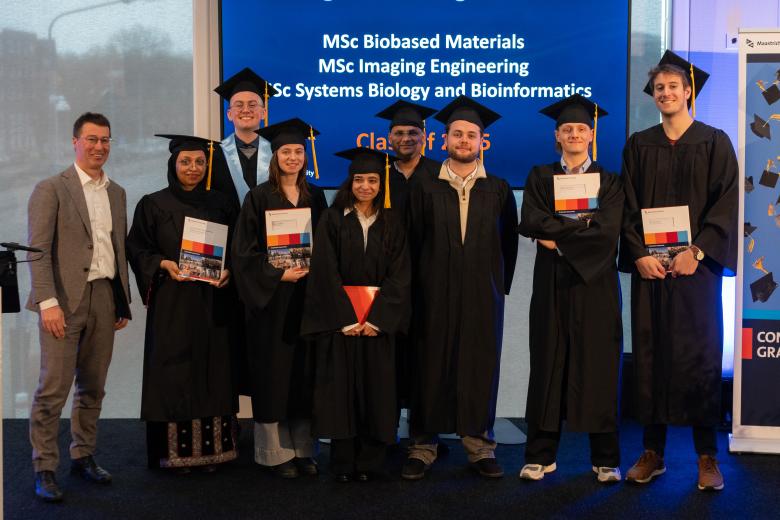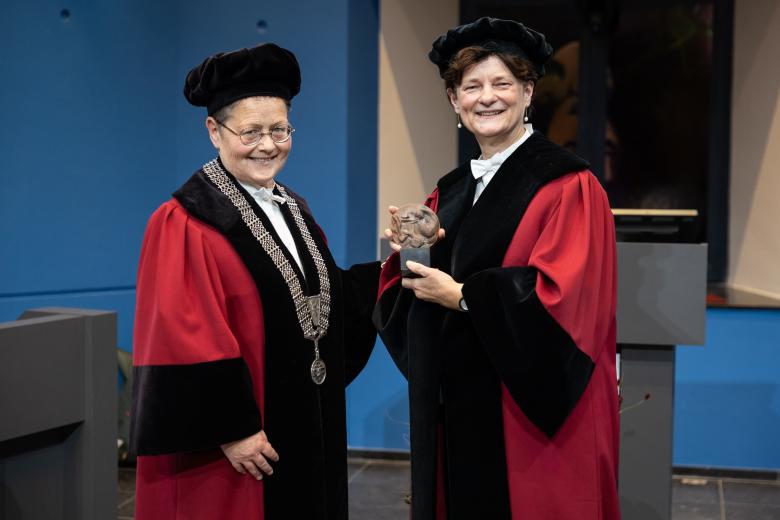There’s not just one Alzheimer's disease
Pieter Jelle Visser was appointed professor at Maastricht University in 2022. He is engaged in research on Alzheimer's disease: the underlying causes and the possibilities for therapy. Visser has always been intrigued by the brain. Researching Alzheimer's fascinates him, not least because much can be learned about how a healthy brain works. Visser is convinced that discoveries currently being made in Alzheimer's disease can later be applied to the treatment of other forms of dementia and other neurodegenerative disorders such as Parkinson's, epilepsy, MS and Huntington's disease. Visser's current work includes promising research into different subtypes of Alzheimer's disease. In this, he seeks explanations for the different effects on therapy in different groups of patients.
Your chair reads: Molecular epidemiology of Alzheimer's disease. What does this mean?
Visser: "Molecular means that we look at proteins that play a role in Alzheimer's disease. The best-known protein is amyloid. One of the hallmarks of Alzheimer's disease is the accumulation of amyloid (in plaques) between nerve cells in the brain. Epidemiology means large studies. So, specifically, I focus on large Alzheimer's studies in terms of proteins.
How do you look at Alzheimer's disease?
"I often describe the course of Alzheimer's in the form of a cascade. The first stage is for the amyloid protein to clump together, creating the plaques. After this, tau gels develop: tangles of intertwined fibers made up of tau protein. Then atrophy occurs. That means the brain shrinks. Finally, dementia develops. The entire process takes about 20 years. Alzheimer's is the most common form of dementia. In the Netherlands, we currently see this disease in about 200,000 patients, and globally, it affects 40 million people. If we do not find a cure, the numbers will increase dramatically over the next 30 years to 400,000 in the Netherlands and 91 million worldwide. In the Netherlands, Alzheimer's disease is also the leading cause of death. It is a miserable disease. Besides the impact the disease has on the lives of many people, it also has a great impact on our society as a whole. After all, healthcare costs are growing at the same rate. We cannot bear them".
How can Alzheimer's be diagnosed?
"We have a number of biomarkers1 for Alzheimer's. Internationally, these are used to make the diagnosis. In the Netherlands, they are not yet in the guidelines. It was long believed that it wasn't beneficial for patients to know if they had Alzheimer's because, without therapy, they wouldn't improve. Until 1984, Alzheimer's was not considered a disease at all. Older people with cognitive problems were said "they are childish" or ‘it runs in the family’. I understand this clinical point of view but I also think: involve the patient! In any case, I myself - if I were that patient - would want to know exactly what I have. We need biomarkers for that."
What biomarkers are there to diagnose Alzheimer's?
"We have the PET scan, the epidural and the blood test. The PET scan is the gold standard. On that you can see the plaques. The epidural is also accurate. Blood markers are slightly less accurate but still give a picture, namely that people with an abnormal PET scan have a lower concentration of amyloid in the blood. The same is true for cerebrospinal fluid. A low concentration of amyloid in blood or cerebrospinal fluid means that the amyloid has moved into the plaques. There is no doubt about the efficacy of the biomarkers. Now all that remains to be determined is: when to use them? For whom and why?".
In your inaugural lecture, you mentioned antibodies as medicine. What is the idea behind this?
"The idea is that antibodies can remove the plaques. The more you clear away, the slower the patient declines. It seems that after 15 years of research we are close to a formula that seems likely to work. That the principle works has been demonstrated in a number of studies using a PET scan. I am very excited about it. However, we are not yet to the point where this is already accessible to patients."
"My hypothesis is that antibodies work but that the differences in response arise because Alzheimer's is not one disease. This may underestimate the effectiveness of treatment".
What do the studies you do show?
"Studies show that the use of antibodies has an effect on the course of the disease: cognitive function deteriorates up to 40% less rapidly. That's a huge step forward. It's important to note that these studies only speak at the group level. If you were to make a graph for each individual patient, you would see a wide range. There are people who remain stable and others who react very quickly: there is heterogeneity. So my current research focuses on the subtypes of Alzheimer's. In this study2, we measure 1100 proteins and look in 400 patients to see what clusters emerge. My hypothesis is that the antibodies work but that the different responses to treatment arise because Alzheimer's is not one disease. We have now described five subtypes. Probably this antibody therapy does not work in all subtypes. For example, there is a group in which immune activation is increased. In this group, the microglia3 get all around the plaques and try to eat them. Giving antibodies to these patients will possibly have a greater effect than in a subtype where the plaques are left alone.
I think we often think too simply about diseases. People have been talking about ‘personalized medicine’ for years. Rightly so, because heterogeneity is something we encounter in all diseases. With new techniques in protein analysis, a world of discoveries is opening up in this field. We may find even more subtypes. But the most important thing is that people ultimately benefit. That is what drives me".
Maastricht University's Alzheimer Center Limburg is also engaged in research on dementia prevention. How do you look at that?
"Because I'm working on the protein side, I look at Alzheimer's disease in a mechanistic way. We are now on top of the disease process with those amyloid plaques and antibody treatment. With concrete results: get rid of the plaques, people deteriorate less quickly. From my perspective, lifestyle interventions are a little further away from the disease process."
But there is a relationship between better-flowing brains and the presence of amyloid?
"There definitely is. Drainage of the amyloid occurs along or in the blood vessels. One hypothesis is that blood flow through the vessels plays a role in draining the amyloid. If you look at the subtypes, it is a simple line of thought: you either make too much amyloid or it is not drained properly. In the latter, blood vessels play a role. Influencing lifestyle can certainly play a role in this because many of those lifestyle aspects affect blood flow to the brain.
Dementia is a complex disease and collaboration between disciplines and perspectives is crucial. ZonMw4has invested heavily in dementia research in recent years. Five consortia are approaching the subject from different angles. I'm in the MODEM project, which investigates the underlying disease mechanisms: the basic side. Colleagues from Alzheimer Center Limburg are in the themes on the prevention and lifestyle side, diagnostics and young onset dementia5. It is of great value that in Maastricht we can approach dementia from all those different sides".
You deal with Alzheimer's, but your research also reaches out to other brain diseases and neurodegenerative disorders.
"Everything we used to be able to investigate only clinically we can now link to biomarkers. What we do now for Alzheimer's will also be relevant for Parkinson's, Lewy Body dementia6 and frontotemporal dementia but also other neurological diseases. There are many similarities: nerve cells, microglia, blood vessels and the processes in and around the cells play a role in all brain diseases. In MS, for example, we also see atrophy: the shrinking of the brain."
What is the greatest value of your research?
"The most important perspective is that there will be a treatment for Alzheimer's and other neurodegenerative diseases. How does my research contribute to that? The answer is that we have clearly shown that there is a very long period of time between getting plaques and getting dementia. We have also shown that amyloid formation is indeed an important factor and that it is associated with cognitive decline. It's not something harmless. Now we are in the midst of researching the subtypes of Alzheimer's disease. In science, it’s often not possible to demonstrate the value beforehand. It's still theory. But if we figure out why certain people respond to antibody treatment and others don't: then this research will immediately be very relevant."
1Biomarkers are measurable substances that provide information about someone's health status. The biomarker can provide information about the likelihood or presence of a disease or condition. Biomarkers can occur in blood but also in other body fluids such as urine, saliva, or tissue.
2This has recently been published in Nature Aging (https://doi.org/10.1038/s43587-023-00550-7).
3Microglia are cells in the brain that ensure the nerve cells can perform their functions, keep our brain healthy, and clean up debris.
4Organization for innovation and research in healthcare that funds dementia research through the Largest Dutch pooling of resources in dementia research | ZonMw.
5Young onset dementia is a form of dementia that develops in individuals younger than 65 years.
6Lewy body dementia is a form of dementia characterized by the abnormal accumulation of proteins in the brain. This form of dementia exhibits symptoms similar to both Alzheimer's disease and Parkinson's disease.
Also read
-
Green school playgrounds boost concentration and wellbeing
Children at schools with green playgrounds are better able to concentrate and display more social behaviour. This is the conclusion of a follow-up study within the long-running project The Healthy Primary School of the Future .
-
Ron Heeren appointed fellow of the Netherlands Academy of Engineering
Professor Ron Heeren, distinguished university professor at Maastricht University (UM) and director of the Maastricht MultiModal Molecular Imaging Institute (M4i), was appointed as a fellow of the Netherlands Academy of Engineering (NAE) on Thursday 11 December.
-
Prof. dr. Mirjam oude Egbrink awarded MUMC+-medal
During her farewell lecture on Friday, 28 November, Prof. Mirjam Oude Egbrink was awarded the MUMC+ medal by Dean Annemie Schols for her distinguished career.